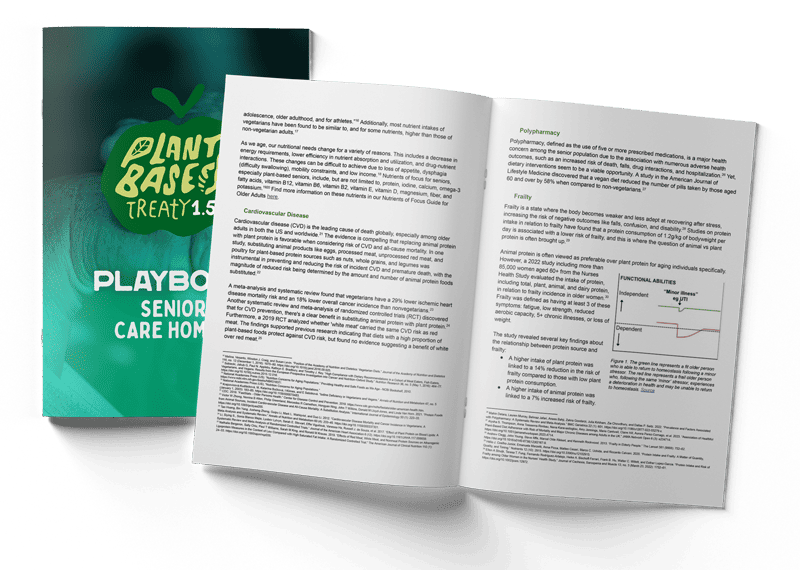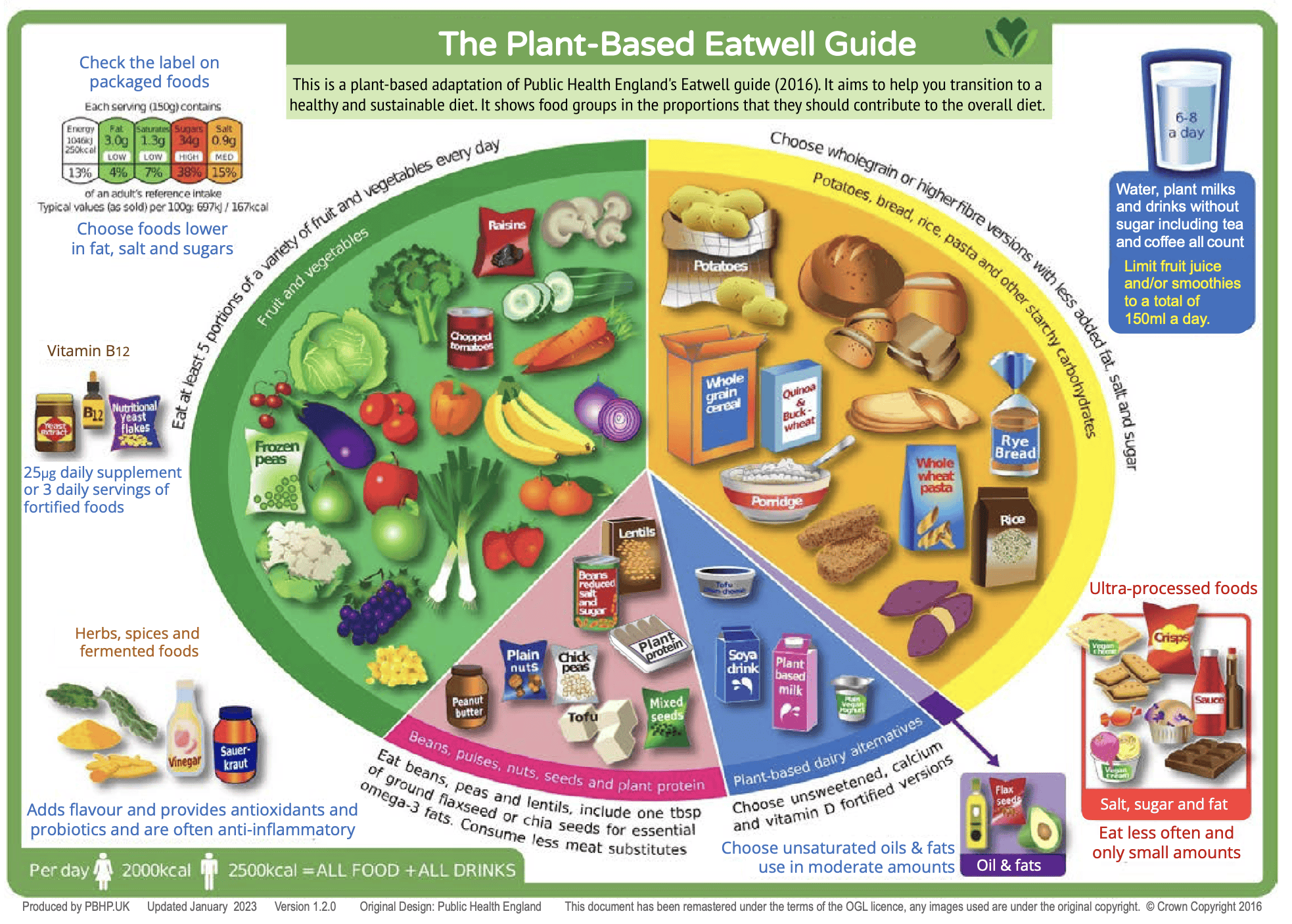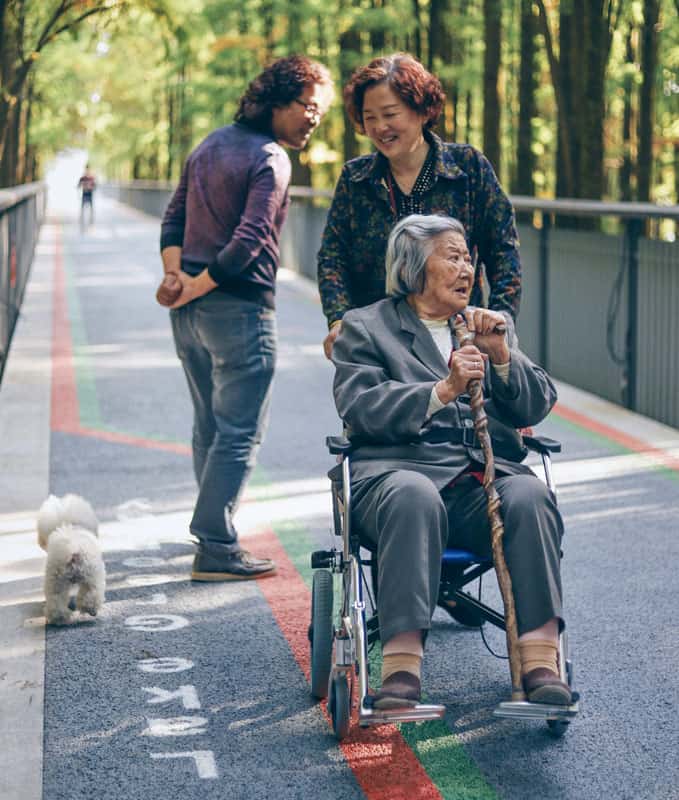Blog
Highlights Of The Plant Based Treaty Playbook On Senior Care Homes
June 14, 2024

The Plant Based Treaty provides a wealth of resources to help the world combat the climate crisis and live within our planetary boundaries. As we enter a critical time in the world, change is urgently needed, and this includes shifting towards sustainable and healthy plant-based diets.
Plant Based Treaty Playbooks of best practices are now available and are an important tool for governments and institutions to learn how to transition to a plant-based food system and incorporate these practices in schools, hospitals, restaurants, and more.
The Playbook for Senior Care Homes helps facilities make dietary shifts aligned with the Canada Food Guide and is supported by organizations like the American Dietetic Association. Senior care homes can play a key role in helping combat climate change while improving the health of residents.
Education, Awareness, And Skills Development
Awareness is key, and health and environmental movies such as Forks Over Knives, and Eating Our Way To Extinction can be screened by educators so they can share information with staff and Chefs. Chefs and front-line staff can then be trained on the benefits of healthy eating and working with new ingredients. Food Service Professional’s Guide to Balanced Menus is a helpful and collaborative resource to raise awareness.

The Plant-Based Eatwell Guide demonstrates a balanced and healthy diet for all ages. Developed by Plant-Based Health Professionals (UK).
Providing a movie night for care home residents with delicious healthy food is a fun way to introduce new meals. UK’s Plant-Based Health Professionals developed the Plant-Based Eat Well Guide, and it’s loaded with useful information about the benefits of eating plant-based foods that are minimally processed, including fruits, vegetables, wholegrains, beans, nuts, and seeds. This can be presented to residents in a useful and informative way and backed up by Canada’s Food Guide which encourages eating more plant-based foods. Adopting greener by default standards and making plant-based options the default menu choice is key for menu transformation.
Seniors in care homes can participate in engaging activities such as Seniors for Climate Action Now and not only be role models for family members but inspire future generations to save our earth and create positive change.
Multiple Health Benefits
The playbook breaks down the nutrients seniors need, including protein, omega-3 fatty acids, fiber, vitamin B12, iron, calcium, vitamin D, iodine, zinc, and more, as outlined in this comprehensive guide.
“The impact of dietary choices on senior health cannot be overstated. In a time where 95% of older adults suffer from chronic conditions and 80% have two or more, dietary changes can be transformative in easing the physical symptoms of chronic conditions and even reversing them. A healthful plant-based dietary pattern specifically is associated with lower risks of mortality and major chronic diseases.”

Decades of scientific research show that a plant-based diet improves health. Particularly among older adults, cardiovascular disease is the leading cause of death globally, and there is convincing evidence that eating more plants and less animal products is beneficial when considering this risk.
“Researchers have shown that a more plant-based diet may help prevent, treat, or reverse some of our leading causes of death, including heart disease, type 2 diabetes, and high blood pressure… Studies have shown plant-based eating can improve not only body weight, blood sugar levels, and ability to control cholesterol, but also emotional states, including depression, anxiety, fatigue, sense of well-being, and daily functioning.” NutritionFacts.org
Many seniors in care homes are on five or more prescribed medications (polypharmacy), and this is a major health concern. A study in the American Journal of Lifestyle Medicine discovered that a vegan diet reduced the number of pills taken by those aged 60 and over by 58% when compared to non-vegetarians. If seniors taking multiple medications can reduce this intake by eating more plants and less animal proteins it’s a win for their health and the environment.
Other health issues affecting seniors are cognitive function and dementia, urological, skin, and eye health, and immunity. Eating more plant-based foods and less animal foods may help prevent or decrease symptoms of these illnesses.
Financial Benefits
The cost of food is an ever-evolving issue and some care homes are looking to save money yet maintain high quality. Seems like the perfect time to transition to a plant-based menu and load up on staple foods like whole grains, chickpeas, and lentils that are more cost-effective when compared to meat-based alternatives. The playbook reports that research from Oxford underlines that embracing plant-based diets can reduce food costs by ⅓ in upper-middle-income to high-income areas like Canada and the US. Humane Society International has a useful guide on plant-based substitutes and explains how everything from dairy to eggs to meat can be subbed out for vegan options and the cost savings for these items.
Care Homes And People Leading By Example
The list of care homes offering vegan options is growing. In the UK, over 1,250 care homes have agreed to cater ethically and provide healthy meals for older vegetarians and vegans. In Canada, Toronto’s Dunfield Retirement Residence provides vegetarian options for residents. In the United States there are many care homes offering healthy vegan options to residents. These include Florida’s Shell Point Retirement Community offering vegan and vegetarian dishes; Connecticut’s Tidelawn Manor accommodating vegan and vegetarian meals as well as No Meat Mondays; and in California, San Diego’s Pacific Regent La Jolla has vegan and vegetarian options at meals.

Roy Burdin celebrates his birthday.
Photo: Vegetarian for Life / Lancashire Post
Roy Burdin was a resident of Longton Village in Lancashire and proved that people of all ages can promote change, even when they are almost 100 years old. Burdin was vegan for 30 years and a lifelong vegetarian who lived independently and prepared his own nutritious whole-food plant-based meals. Up until his passing at age 98, he was busy advocating for plant-based options for assisted living facilities and campaigning for local care homes to ensure they had sufficient vegan and vegetarian meals for residents. In a 2018 article in Lancashire Post, Burdin said he is vegan for life, and humorously joked that the only downside to veganism might be living too long.

Miriam Porter is an award-winning writer who writes about veganism, social justice issues, and eco-travel. Miriam currently lives in Toronto with her son Noah and many rescued furry friends. She is a passionate animal rights activist and speaks up for those whose voices cannot be heard.
More from the blog
Ten Plant Based Treaty Celebrity Endorsers Making A Difference
By Miriam Porter
Kickstart Spring With A Nourishing Green Smoothie By Dr. Brooke Goldner
By Miriam Porter
From Global Advocacy To Menu Changes: Plant Based Treaty’s Goals For 2025
By Miriam Porter



